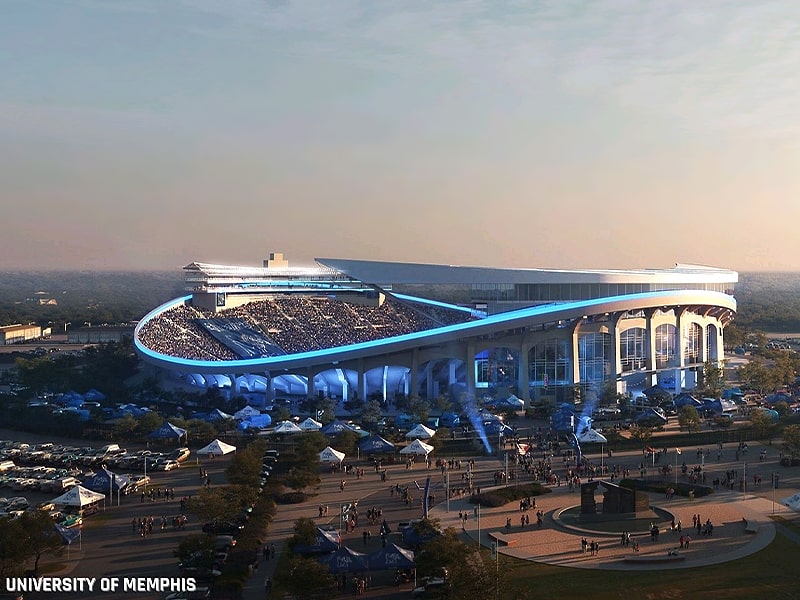Major renovations are coming to Memphis’ (Tennessee, US) Liberty Stadium.
The ‘Fox 13’ stated that the University of Memphis and the City of Memphis announced plans to pursue a $150-$200 million project to renovate and modernize the home of Memphis Tigers Football.
The 58,325-capacity Liberty Bowl Memorial Stadium, originally named Memphis Memorial Stadium, is a football stadium located at the former Mid-South Fairgrounds in the Midtown area of Memphis, Tennessee, United States. It serves as the residence of the Memphis Tigers football.
The Memphis Tigers football team represents the University of Memphis in college football in the National Collegiate Athletic Association (NCAA) Division I Football Bowl Subdivision. The Tigers play in the American Athletic Conference as an all-sports member. They play their home games at the Liberty Bowl Memorial Stadium. The team’s head coach is Ryan Silverfield.
The University of Memphis is a public research university in Memphis, Tennessee (US). Founded in 1912, the university has an enrollment of more than 22,000 students.
The ‘Fox 13’ further stated that the elements of the project include:
- A transformation of the stadium’s West side, providing several innovative premium seating options;
- Creating a hospitality experience within the halo space surrounding the stadium;
- Other new seating options, such as family boxes on the North end and party deck patios for students on the South end; and
- A potential repurpose and retrofit of the East side suite tower.
The project is set to be completed before the 2025 football season.
Laird Veatch, University of Memphis Vice-President and Director of Intercollegiate Athletics, said this is a more cost-effective solution than building a brand new stadium on the University of Memphis campus, which would’ve cost upwards of $400 million.
He added, “It will demonstrate a true commitment to sustainable competitive recruiting success, it will provide a tremendous modern-day fan experience, and it secures positive, long-term economic impacts for both the University and the City.”
Memphis Mayor Jim Strickland said it’s also going to bring in more than just football fans – “The current configuration of the stadium is out of sync with current concerts. If you’re my age, you remember when bands would come and they’d set up on the field, that can’t happen now. So part of the renovation is opening up the North side of the stadium so we can stage a concert now. This allows that to happen.”
On feedback from the surrounding neighborhoods, Strickland said the City has hosted countless town halls for people to learn more and ask questions. He said the reception to any renovations to the stadium and expansion of Liberty Park has been positive – “For the development of Liberty Park, there’s been a lot of interaction with the neighborhood. We’ve had town hall meetings out there, they’re really excited about the new sports complex that’s coming out right now and would be completed in November. That’s been the focal part of the excitement.”
One neighbor who lives on a street right next to the stadium said bringing in more revenue to the surrounding area is welcomed.
Said James Ford, who has lived in the area for 37 years and allows people to park in his front lawn, “I think it’s a good thing. If they’re remodeling, putting more seats in there, more people gonna come. They gonna have more revenue in.”
Strickland and Veatch said they will be taking the next couple of months to weigh funding options and decide how much money will be needed from the City, the University and private sources.
Added Veatch, “We started this process with a specific set of transformational goals in mind, and this renovation hits all of them. It will demonstrate our commitment to sustainable competitive and recruiting success, provide a tremendous, upgraded fan experience and secure positive long-term economic impacts for our University and City, all while taking advantage of the current stadium infrastructure and the investments already underway at Liberty Park.”
Over the past several months, the university studied options for both a renovation of Liberty Stadium and construction of a new football stadium with global stadium architecture design firm Populous.
After analyzing both possibilities with university and Government leaders, the conclusion was to focus on a transformation of the stadium.
Explained Veatch, “This transformation will also further our partnership with the City and take advantage of the existing stadium infrastructure that includes great sightlines, onsite parking and an incredible tailgating scene on Tiger Lane. In addition to multiple improvements made to the stadium in recent years, we are also excited to complement the investments already underway in Liberty Park.”
Currently, approximately halfway through construction, the site of the old Mid-South Fairgrounds surrounding Liberty Stadium is being re-energized into Liberty Park.
Essentially creating a stadium district, Liberty Park will consist of a youth sports facility, named the Memphis Sports and Events Center, and also include entertainment venues, dining, retail, office space, two hotels, and 150 apartments.
Commented Strickland, “Now is a time of historic public and private reinvestment in our City. Whether through private developments or Citywide public projects, billions of dollars are helping to bring new life and new energy to Memphis. This significant investment in the stadium will be a tremendous compliment to the 227,000 square-foot youth sports complex just across the street on Early Maxwell, as well as the overall transformative Liberty Park development.”
Additional information will be announced as project milestones are achieved.
Continue to follow Coliseum for latest updates on venues business news. Coliseum is dedicated towards building the best global community of sports and entertainment venue executives and professionals creating better and more profitable venues.
Become a member of the only Global Sports Venue Alliance and connect with stadiums, arenas and experts from around the world. Apply for membership at coliseum-online.com/alliance and make use of the 365Coliseum Business.
